Michelin India Continues To Bet High On Premium Segment
- By Sharad Matade
- February 21, 2025
Michelin India is doubling down on the country’s fast-growing premium tyre segment, a niche yet rapidly expanding market. The company, which has been manufacturing radial commercial tyres at its Chennai plant, is now investing over INR 5.64 billion in a brownfield expansion to produce passenger car radial tyres at the same facility.
Today, Michelin India is not just a manufacturing hub but also a critical part of the global Michelin ecosystem, housing the company’s world AI headquarters and a state-of-the-art R&D centre, growing from a modest operation with fewer than 100 employees to a total workforce of nearly 3,000.
In an exclusive interview with Tyre Trends, Shantanu Deshpande, Managing Director, Michelin India, touches upon the company’s strategic priorities, the evolving tyre industry and its ambitious plans for the premium and electric vehicle (EV) segments.
He also sheds light on Michelin’s sustainability initiatives and how the company is leveraging India’s growing infrastructure and consumer preferences to solidify its position as a market leader in the premium segment. The premium proposition:
Catering to discerning consumers
When Michelin first entered the Indian market, it was a niche player with a limited presence. The company’s initial focus was on introducing radial tyres to a market dominated by bias tyres. Over the years, Michelin has not only expanded its manufacturing footprint but also cemented its position as a leader in the premium tyre commercial tyre segment.
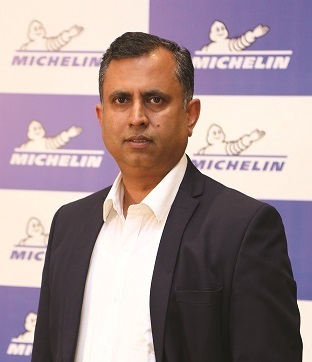 “We started with TBR tyres (Truck and Bus Radial) over a decade ago,” Deshpande recalls. “Back then, the industry was dominated by bias tyres. Today, radial tyres account for almost 70 to 80 percent of the market, and we’re now seeing a shift from tube-type to tubeless tyres. This transformation has been driven by infrastructure improvements and the rise of e-commerce, which demands faster, more efficient logistics.”
“We started with TBR tyres (Truck and Bus Radial) over a decade ago,” Deshpande recalls. “Back then, the industry was dominated by bias tyres. Today, radial tyres account for almost 70 to 80 percent of the market, and we’re now seeing a shift from tube-type to tubeless tyres. This transformation has been driven by infrastructure improvements and the rise of e-commerce, which demands faster, more efficient logistics.”
Currently, tubeless tyres have a 5-10 percent market share, while tube tyres own the rest.
Deshpande highlights the dramatic changes in India’s road infrastructure as a key driver of this evolution. “When I was a sales executive, the Delhi-Mumbai corridor took eight days to traverse. By the end of this year, it will take just 24 hours. Truck speeds have increased from 25-30 km/h to 40-50 km/h, and soon, they’ll reach 60 km/h, comparable to Europe. These changes have created a demand for high-performance tyres that can handle heavy loads and long distances,” he explains.
The rise of e-commerce has further accelerated this demand. “Some fleets are running 25,000 kilometres per month,” Deshpande notes. “This is a significant distance for trucks, and it underscores the need for tyres that offer durability, fuel efficiency and safety.”
Michelin’s focus on premium tyres has been a cornerstone of its strategy in India. Deshpande emphasises that the company’s value proposition lies in offering a lower total cost of ownership (TCO) for fleet operators, particularly in the TBR segment.
“Fuel accounts for 60 percent of a truck operator’s costs,” he explains. “Michelin intends to work with like-minded fleet operators who understand the value proposition of TCO. We are changing their tube radial tyres to tubeless radial tyres. For instance, our X Multi Energy Z+ tyre, with the lowest rolling resistance in the country, can save up to 15 percent on fuel compared to traditional tubeless radial tyres. This is a game-changer for fleet operators who understand the importance of TCO.”
Cost per kilometre Vs total cost of ownership
Deshpande elaborates on Michelin’s approach to cost per kilometre (CPK) and total cost of ownership (TCO), which are critical metrics for fleet operators.
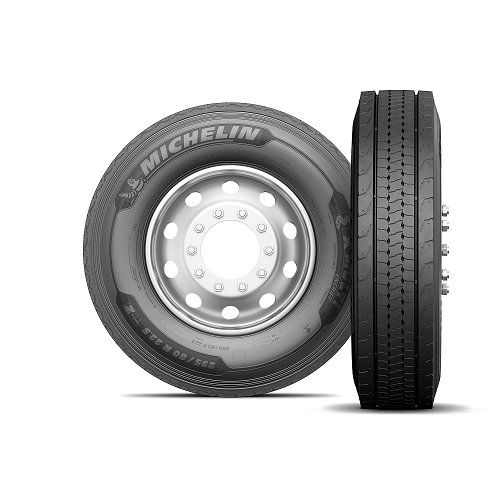
“Cost per kilometre is one way to simplify invoicing, but it’s not the complete picture,” he explains. “While CPK focuses on the life of the tyre, we believe in a broader approach – total cost of ownership. A Michelin tyre not only lasts longer but also saves fuel, which is a significant cost for fleet operators. It’s important to look at the overall savings, not just the tyre’s lifespan.”
Michelin offers innovative service models to fleet operators, including on-site maintenance and diagnostics. “We have models where technicians are stationed at fleet yards,” Deshpande says. “We provide free diagnostics to identify issues like under-inflated or misaligned tyres, which can significantly impact costs. We then offer maintenance services to ensure optimal performance, and this is a paid service – it’s not free. We work with fleets to show them the cost savings we can bring per-truck, per-month basis.”
The company also invests in equipment like tyre fitting and alignment machines at fleet yards. “We bear these costs into our service offerings,” Deshpande adds.
Premium passenger radial tyres: New target
In the passenger vehicle segment, Michelin is targeting the growing demand for premium and luxury cars.
In September 2024, Michelin India entered the passenger car radial tyre market with the launch of an INR 5.64-billion brownfield project in Thervoy kandigai, near Chennai. “This investment is over and above the existing investment of INR 28.40 billion for the company in our factory,” adds Deshpande
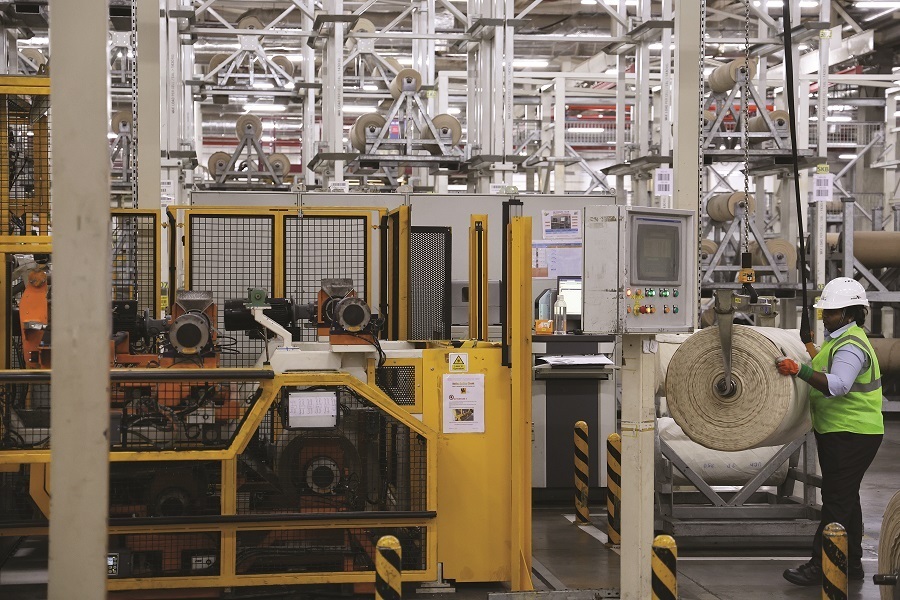
“We believe there is significant potential in the passenger segment for several reasons. Over the last three years, the vehicle landscape in India has significantly changed,” Deshpande says. “Today, most new SUVs and cars are being launched with bigger tyre sizes, such as 16-inch or 17-inch. This shift aligns perfectly with our focus on premium tyres.”
According to Deshpande, the shift towards premium products extends beyond automobiles. “There is a growing demand for premium products across all walks of life, not just automobiles. This includes two-wheelers, luxury bags and other high-end items. Consumers are willing to pay for quality,” adds Deshpande.
Deshpande points to the changing profile of Indian consumers as a key factor driving this trend. “The Indian consumer is evolving,” he says. “Ten years ago, a Mercedes owner was typically an industrialist or a Bollywood star. Today, young professionals in their 30s are driving BMWs and Mercedes. Last year, close to 50,000 cars priced above INR 50 lakh were sold in India, and we expect this number to double soon.”
Improved road infrastructure has revolutionised leisure travel habits. “10 to 15 years ago, travelling from Mumbai to Delhi by car was uncommon. It’s possible to drive from Mumbai to Nagpur in eight hours today,” Deshpande said. “People now prefer driving long distances rather than flying, which has significantly changed how consumers view their cars.”
Michelin’s Chennai plant is strategically focused on producing tyres for this premium segment. “We will soon begin manufacturing car tyres in India. The size range will be 16” and above,” Deshpande says. “Our goal is to cater to the top 25-30 percent of consumers who value quality and are willing to pay for it.”
The company’s retail distribution strategy is equally focused on maintaining a premium experience. “A Michelin customer, such as a BMW owner, expects nothing less than a premium experience,” Deshpande explains. “We’re not aiming for a vast network of dealers. Instead, we’re focusing on well-branded shops that offer a superior consumer experience.”
The company plans to open its premium retail shops for passenger car tyres in the top 15 to 20 cities to cater to the replacement market.
The EV opportunity: Balancing performance and sustainability
As the automotive industry shifts towards electrification, Michelin is positioning itself as a leader in EV tyres, and Deshpande also acknowledges the unique challenges and opportunities this transition presents.
“EV tyres require specific designs, such as low rolling resistance and larger diameters,” he explains. “But it’s not just about range. Load-carrying capacity, noise reduction and durability are equally important. Michelin has mastered the art of balancing these performance criteria.”
Deshpande dispels the misconception that EV tyres are fundamentally different from those used in internal combustion engine (ICE) vehicles. “Some of our tyres are excellent for ICE vehicles but even better for EVs,” he says. “We don’t design tyres purely for range. Instead, we ensure they deliver the right balance of performance, safety and comfort.”
Michelin’s approach to EV tyres is already yielding results. “The tyres we’ve designed for ICE vehicles are being adopted by EV manufacturers globally,” Deshpande reveals. “In India, as the EV market grows, we’ll leverage our global expertise to cater to this segment.”
Sustainability at the core
Sustainability is a key pillar of Michelin’s strategy, both globally and in India. The company’s Chennai plant is a zero-discharge facility that recycles all its water through rainwater harvesting. By the end of this year, the plant will be powered entirely by renewable energy.
Deshpande asserts,” Our Chennai plant is one of the most high-tech and green facilities in the Michelin world. It’s a benchmark for safety, modernity and environmental responsibility.”
The tyres manufactured in Chennai are exported to North America, Europe, Africa and the Middle East.
Michelin’s commitment to sustainability extends beyond its manufacturing processes. The company also focuses on developing tyres that increase fuel efficiency and reduce emissions. “Our X Multi Energy tyre, for instance, has a rolling resistance of just 4.5 kg per tonne, compared to the industry average of 6.5-7 kg per tonne,” Deshpande says. “This translates to significant fuel savings and a lower carbon footprint.”
Premium two-wheeler segment: Another growing opportunity
Michelin India continues its presence in the two-wheeler tyre segment through a manufacturing arrangement with STL (Spinmax tyres Pvt Ltd) via an offtake arrangement.
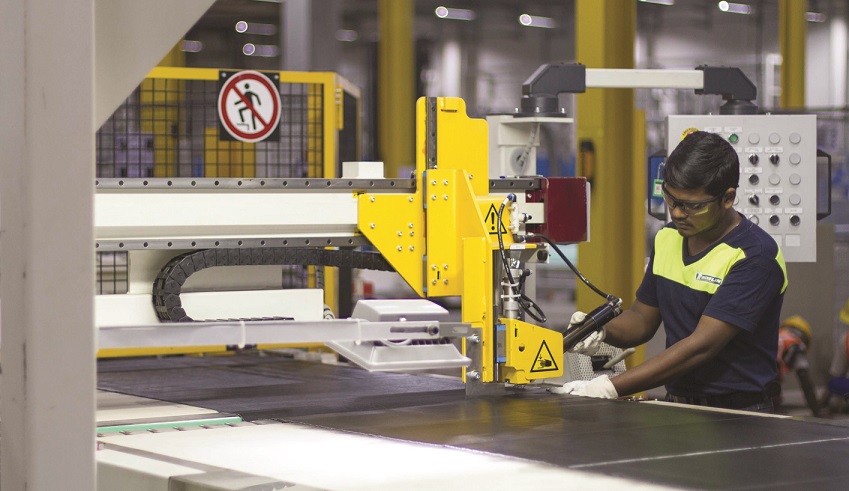
Despite current import restrictions, the company eyes opportunities in India’s evolving motorcycle market.
“The two-wheeler segment is undergoing significant transformation,” says the Managing Director of Michelin India. “With the increasing launch of high-powered bikes like Royal Enfield and other global brands, along with Indian manufacturers producing world-class bikes for export, this segment presents a great opportunity.”
The company sees a natural overlap between its target markets. “The profile of consumers buying high-powered bikes often overlaps with those buying premium cars,” Deshpande thinks. Michelin plans to focus on motorcycles and scooters of 250 cc and above, where the company believes its brand visibility and value proposition are strongest.
The strategy mirrors Michelin’s approach in the passenger vehicle segment. The company maintains local outsourced manufacturing of two-wheeler tyres while exploring future expansion opportunities.
The French tyre maker continues to evaluate opportunities in India’s growing premium two-wheeler market as domestic manufacturers increasingly target global markets with higher-end models.
Michelin India: A place for global R&D & AI Centre
In addition to Michelin India’s manufacturing capabilities, it has also established a Global Hub in Pune focusing on next-generation technologies such as AI, data engineering, digital services and R&D centre, which supports research efforts for the Michelin Group worldwide.
Deshpande is also optimistic about the role of Indian R&D in Michelin’s global operations. “Our Pune centre is not just supporting India; it’s contributing to global markets,” he says. “The talent here is recognised for its innovation and expertise, not just cost arbitrage. At our Global Competency Center in the city, the company isn’t just optimising tyres but redefining how they’re designed, manufactured and used. This is a proud moment for us.”
As Deshpande puts it, “Michelin is not just selling tyres; we’re selling safety, comfort and peace of mind. In a market as dynamic as India, that’s a value proposition that resonates.”
KraussMaffei Technologies Appoints Dirk Musser As New Managing Director
- By TT News
- February 27, 2026

KraussMaffei Group is set to implement a leadership transition at its subsidiary, KraussMaffei Technologies, with a change at the board level. Jörg Stech, who has served as Chairman of the Board and global head of injection moulding, automation and additive manufacturing since 2023, will be departing on 31 March 2026 at his own request. He will be succeeded by Dirk Musser, the current Head of Group Transformation at the parent company, who has been appointed as the new Managing Director effective 1 April 2026. The leadership handover between Stech and Musser is already in progress, ensuring a seamless transition.
Stech’s tenure unfolded during a difficult economic period marked by financial losses and a contracting market. He responded with decisive measures aimed at margin enhancement and balance sheet improvement, which laid the groundwork for the company's long-term stability. Under his direction, the product lineup for injection moulding and automation was revitalised with the introduction of the LRXplus linear robot, the fully electric PX series and the MC7 control system, all launched in late 2025 alongside new artificial intelligence tools. He also launched a multi-year development initiative and pushed the company into new markets, such as aerospace and drone technology, by leveraging expertise in specialised processes like ColorForm. Through a focus on operational excellence, pricing discipline and capital efficiency, Stech guided the company to a significantly more resilient position compared to three years prior, despite the persistent downturn in injection moulding.
Musser brings to his new role extensive experience in transformation and finance. In his current capacity, he has already been closely involved with KraussMaffei Technologies, collaborating with its leadership to drive strategic initiatives and enhance operational performance. His qualifications include sharp analytical abilities, a strong grasp of industrial processes and a broad international perspective. An economist by training, Musser has accumulated over 20 years of leadership experience across various technology and industrial sectors. His background includes leading major transformation and turnaround projects at CRRC New Material Technologies, where he stabilised plant earnings in North America, as well as directing operational and financial restructurings during his time at Deloitte. He has also held roles with P&L responsibility, managing global supply chains and post-merger integrations at CRONIMET and has prior experience with automotive manufacturers including Daimler and Fujian Benz Automotive in China.
Alex Li, CEO, KraussMaffei Group, said, "Jörg Stech took on responsibility in a difficult situation, set clear priorities and launched decisive initiatives. The successful market launch of the LRXplus linear robot and the all-electric PX machine series, the consistent focus on profitability and the sustainable strengthening of our balance sheet are visible results of this work. We would like to express our sincere thanks to Jörg Stech for his leadership, integrity and team spirit. We value Dirk Musser as a leader who combines strategic clarity with operational excellence. In a short period of time, he has provided vital impetus for the transformation of the group and impresses with his analytical strength, decisiveness and deep understanding of our processes – not least through his successful collaboration with the managing directors of KraussMaffei Technologies. We are convinced that he will continue on this path with clarity and creative drive to successfully align KraussMaffei Technologies."
Stech said, "After many years in an environment full of technological, economic and geopolitical challenges, I look back with great gratitude on a time in which I was always surrounded by an exceptional workforce. Together, we achieved things that many initially thought were impossible. This cooperation, this willingness to push boundaries and create something new, was a joy for me. My special thanks go to all stakeholders in the company and, of course, to all employees. I leave with respect, gratitude and the conviction that this long-established company will continue to achieve great things in the future."
Musser said, "Together with my fellow managing directors Dr Frank Szimmat and Markus Bauer, I want to resolutely drive forward the further development of KraussMaffei Technologies. Our focus is on further expanding stability and performance and taking the necessary steps to successfully position the company in a dynamic market environment. I look forward to shaping this path together with our teams.”
Dario Marrafuschi Succeeds Mario Isola As Pirelli’s Head Of Motorsport
- By TT News
- February 27, 2026
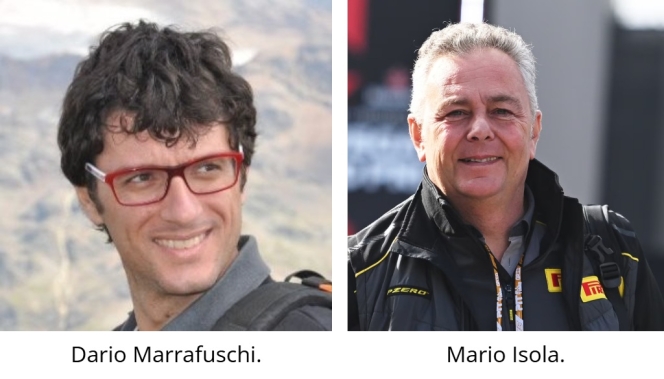
Italian tyre manufacturer Pirelli has announced that Dario Marrafuschi will become the Head of its Motorsport Business Unit, effective 1 March. He succeeds Mario Isola, who will remain with the company until 1 July to assist with the leadership transition.
Marrafuschi joined Pirelli in 2008 and has held positions within the Formula 1 Research and Development department. Most recently, he led the development of the company's road products.
He will report to Giovanni Tronchetti Provera, Executive Vice-President of Sustainability, New Mobility & Motorsport. The appointment comes as the company continues its role as the tyre supplier for various global motorsport categories.
Isola departs the company following a tenure that included the expansion of Pirelli’s motorsport operations. The company stated that Isola will pursue other professional opportunities following his departure in July.
Changing Tyre Dynamics In A Changing Car Market
- By Sharad Matade
- February 27, 2026
For Continental Tires India, the passenger vehicle market in India is entering a phase where scale and structure are finally aligning with its longstanding premium ambitions. Passenger vehicle sales reached a record 4.3 million units in 2024, expanding by 4–5 percent year on year, but it is the composition of that growth – rather than the headline volume – that is reshaping the company’s strategy. Utility vehicles now account for approximately 58 percent of total passenger vehicle sales, up sharply from about 51 percent the previous year, cementing SUVs and crossovers as the dominant force in the market.
This structural shift has direct consequences for tyre manufacturers operating at the upper end of the value spectrum. Larger vehicles bring higher kerb weights, bigger wheel diameters and greater expectations around refinement, safety and performance. For Continental, the change represents not merely an increase in addressable demand but a decisive move towards tyre categories where technology differentiation and pricing discipline can coexist.
Samir Gupta, Managing Director of Continental Tires India, calls this phase a turning point, not a temporary high. He says the surge in utility vehicles – driven by electrification and more premium cars – fundamentally changes the economics of the passenger tyre market in India.
“Let me clarify one thing first. The utility vehicle segment is no longer small. Last year, around 60 percent of passenger vehicles sold in India were utility vehicles, and including first-time buyers upgrading within this segment, the share goes beyond 65 percent,” Gupta says.
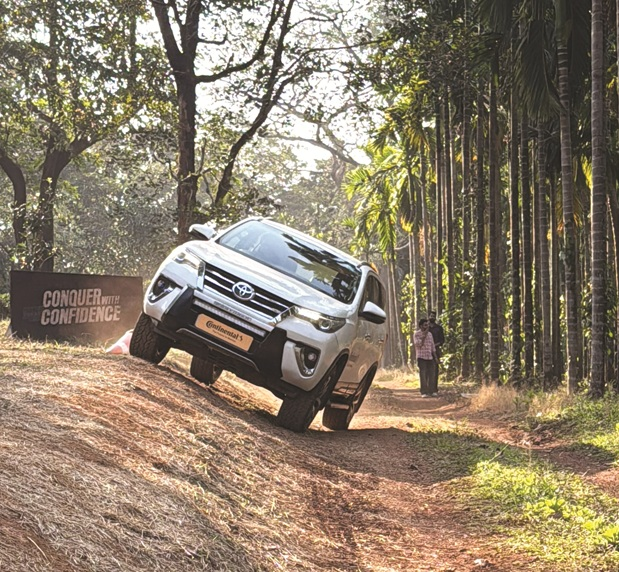
Industry data broadly supports this assessment. SUVs alone contributed close to three-fifths of all passenger vehicle sales in 2024, with compact utility vehicles accounting for a significant share of incremental volumes. The overall passenger vehicle market, at around 4.3 million units, has thus become structurally skewed towards larger formats – an inflection with long-term implications for tyre sizing, load ratings and product mix.
This shift shows in replacement demand. As vehicle footprints grow, rim diameters are increasing. “The market is clearly moving from smaller to bigger rim sizes. Demand for 17-inch and above tyres is rising sharply,” Gupta says. While these tyres are still a minority, their growth far outpaces the overall passenger tyre market.
Electrification is accelerating the shift. A substantial proportion of electric passenger vehicles sold in India today are SUVs, and Continental expects EVs to account for more than 50 percent of the passenger vehicle segment within five years. For tyre manufacturers, this creates new technical requirements – higher torque tolerance, lower rolling resistance and stringent noise control. “That creates a significant opportunity for us because our strengths lie in premium, high-performance tyres,” Gupta says.
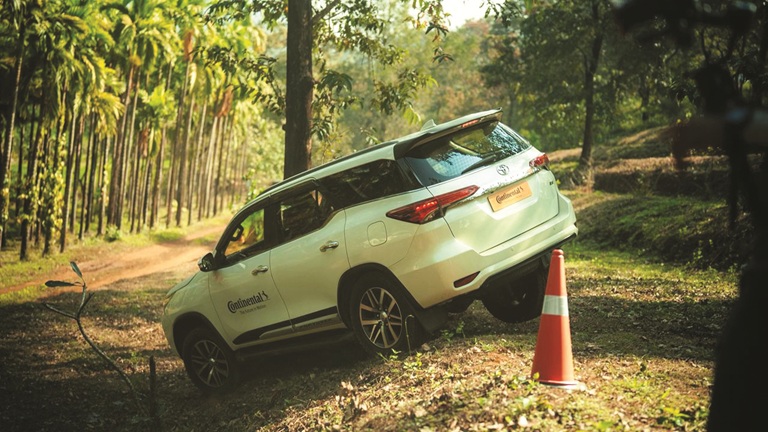
Despite these favourable structural trends, premium tyres have historically struggled to gain traction in India. For much of the past decade, the market remained intensely price-sensitive, with tyres treated largely as commoditised replacement items. Continental’s response, Gupta explains, has been consistent rather than tactical pricing. “Right from the beginning, we have focused on fair pricing. The idea is simple – if we can clearly differentiate on performance and consistently deliver on those promises, price recovery will follow,” he explains.
The broader environment is now becoming more supportive. As vehicle prices rise and consumers migrate towards larger, more sophisticated vehicles, willingness to spend on tyres that enhance safety, comfort and driving confidence is increasing. This trend is also evident at the top end of the market. Premium and luxury passenger vehicle sales reached approximately 51,500 units in 2024, up around 6 percent year on year and crossing the 50,000-unit threshold for the first time – a symbolic marker of premium consumption in India.
Gupta sees premiumisation extending beyond luxury vehicles. “Earlier, India was extremely price-sensitive, but that is changing in higher segments. Consumers are upgrading vehicles and are more willing to invest in tyres that enhance safety, comfort and confidence,” he says.
The intensification of competition, with global premium tyre brands expanding or re-entering India, is viewed as a positive development. “Competition is always good,” Gupta says. “It gives you room to grow and improve.” More importantly, he believes it will help reframe the market. “More premium players will help move the market away from being purely cost-driven to being value-driven,” he adds.
Replacement market dynamics reinforce this view. Of the roughly 32–33 million passenger tyres replaced annually in India, tyres sized 17 inches and above account for about 12–13 percent. While the overall replacement market grows at 5–6 percent per year, this high-diameter segment is expanding at over 20 percent annually, closely tracking the shift in new vehicle sales.
This sharper focus on passenger tyres also explains Continental’s decision to exit the truck and bus radial segment in India. Gupta stresses that the decision was strategic rather than operational. Continental entered the TBR market in 2014, invested significantly and received strong feedback on product performance.
However, the economics proved limiting. Gupta says, “TBR in India is largely a B2B, fit-for-purpose market. Even if you have the best tyre, willingness to pay remains limited because fleet operators are under constant margin pressure.” Although commercial tyres offer higher absolute margins per unit, they consume substantially more raw material. “One commercial tyre uses six to eight times the raw material of a car tyre. Percentage margins are actually higher in passenger tyres,” Gupta explains.
After reviewing its portfolio, Continental chose focus over breadth. Exiting TBR allows the company to concentrate capital, technology and management attention on passenger and light truck tyres, where differentiation is more readily monetised. Gupta rejects the idea that a narrower portfolio weakens the company’s position. Commercial and passenger tyre customers, he argues, are fundamentally different – one driven by procurement economics, the other by consumer perception and emotion.
Indian consumers, Gupta believes, are becoming more tyre-aware. “Premiumisation is happening across the vehicle industry, not just in tyres. As consumers move to larger and more premium cars, their expectations also rise,” he says. Where tyres were once treated as an afterthought, buyers increasingly recognise their role in braking, grip, noise and overall driving confidence.
This change is evident at the retail level. Continental now operates more than 200 brand stores across India, and feedback from retail partners suggests customers are more informed and more demanding. Availability remains critical. “There is no point launching premium tyres if customers cannot find them,” Gupta says.
To support future demand, Continental is investing around INR 1 billion at its Modipuram plant, with the focus squarely on passenger and light truck tyres. The expansion will extend manufacturing capability from the current 20-inch limit to 22–23 inches, aligning local production with emerging vehicle trends.
Localisation, Gupta argues, is about adaptation rather than compromise. Indian road conditions, climate and driving habits require specific tuning without diluting global performance standards. Education and availability remain the principal challenges.
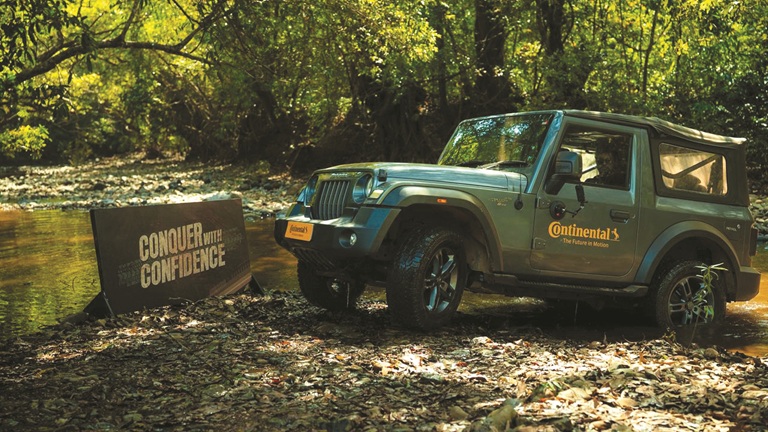
The recent launch of the CrossContact A/T² in India reflects this strategy. Introduced during Continental’s Track Day at Dot Goa 4x4, the product positions India among the early global markets for the tyre. “The first thing you notice is noise – or the lack of it,” Gupta says. “You hear the air-conditioning, not the tyre.” Ride comfort, grip and consistency across terrains define its appeal. As Gupta puts it, “Jahan tak soch jaati hai, wahan tak yeh tyre kaam karta hai.”
Looking ahead, Continental remains largely insulated from shifts in original equipment strategies, such as the gradual removal of spare tyres. Improved carcass design and stronger sidewalls are reducing puncture risk, but the company’s primary focus remains the replacement market.
For Gupta, the question is no longer whether India is ready for premium tyres, but how effectively manufacturers execute. “The market is finally ready for premium tyres,” he concludes. With passenger vehicle sales at record levels, SUVs firmly dominant and premium consumption expanding, Continental believes it is well positioned to grow alongside India’s evolving mobility landscape.
Falken Tyre Europe GmbH Rebrands As DUNLOP Tyre Europe GmbH
- By TT News
- February 26, 2026

Falken Tyre Europe GmbH has officially transitioned to operating under the name DUNLOP Tyre Europe GmbH, following its formal registration with the Offenbach Local Court. This change signifies a pivotal development for the Sumitomo Rubber Industries subsidiary. The rebranding represents a calculated and essential move to establish a more formidable European footprint for the DUNLOP brand. Company leadership acknowledges that this evolution is built upon the considerable equity established by Falken, including its strong market recognition, unwavering product quality and the commitment of its personnel.
This strategic shift positions the organisation under the umbrella of a globally respected marque, with its future strategy firmly centred on expansion, pioneering advancements and ecological responsibility. A prominent symbol of this new chapter will be unveiled shortly, with the renaming of the DUNLOP City Tower in Offenbach. A formal ceremony will mark the occasion, featuring the presentation of the DUNLOP logo at the tower. The event is set to be attended by Offenbach's Lord Mayor, Dr Felix Schwenke, alongside the company’s managing directors, Hiroshi Hamada and Markus Bögner, and the newly enlarged DUNLOP team.
Markus Bögner, Managing Director and President, DUNLOP Tyre Europe GmbH, said, “The name change is an important milestone of which we can be very proud. It strengthens our identity and underlines that we are ready for the next steps. Our strong heritage with Falken is and remains part of our success, laying the foundations for DUNLOP’s future in Europe. Our thanks go to all our employees and partners who have supported and accompanied us on this journey.”







Comments (0)
ADD COMMENT